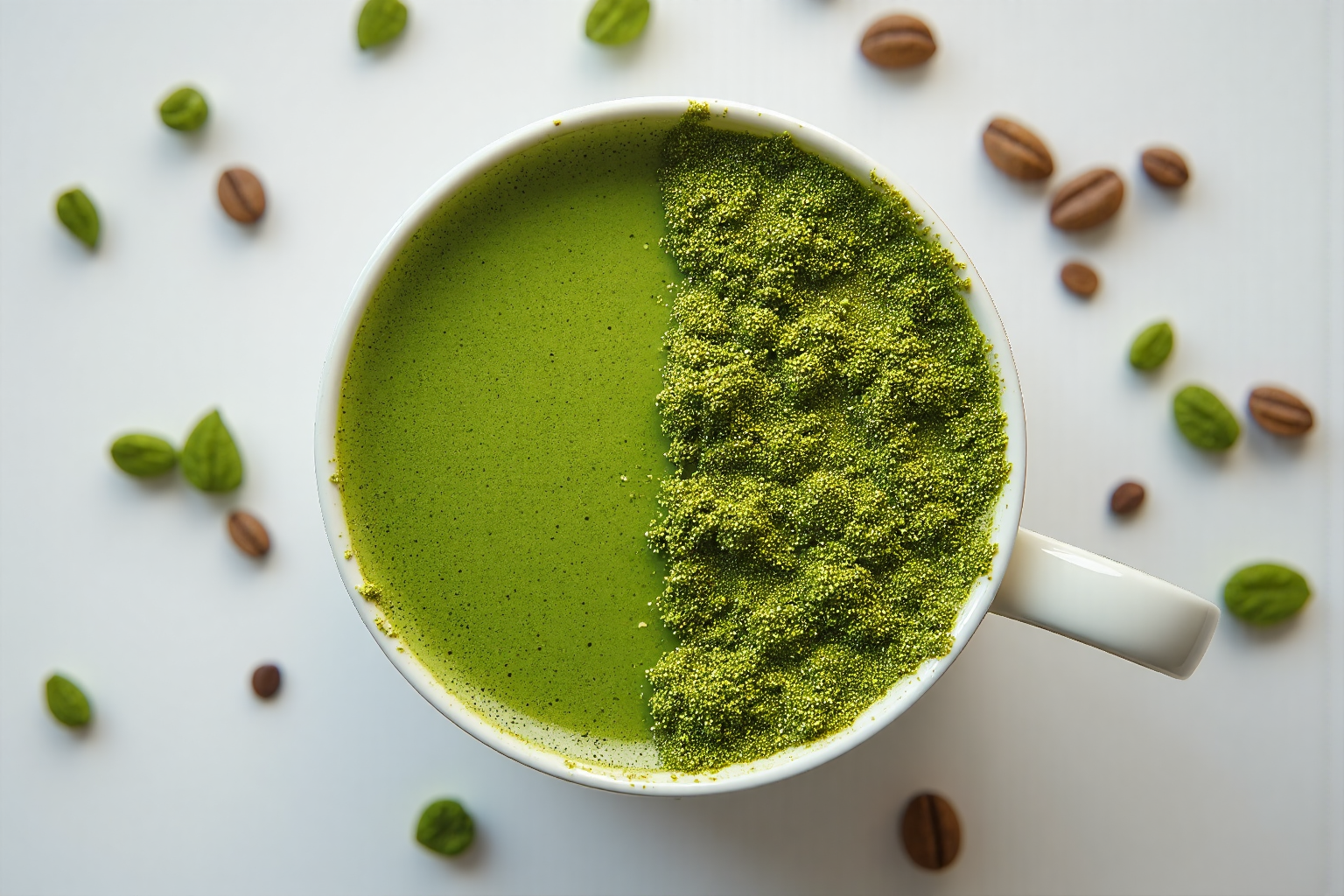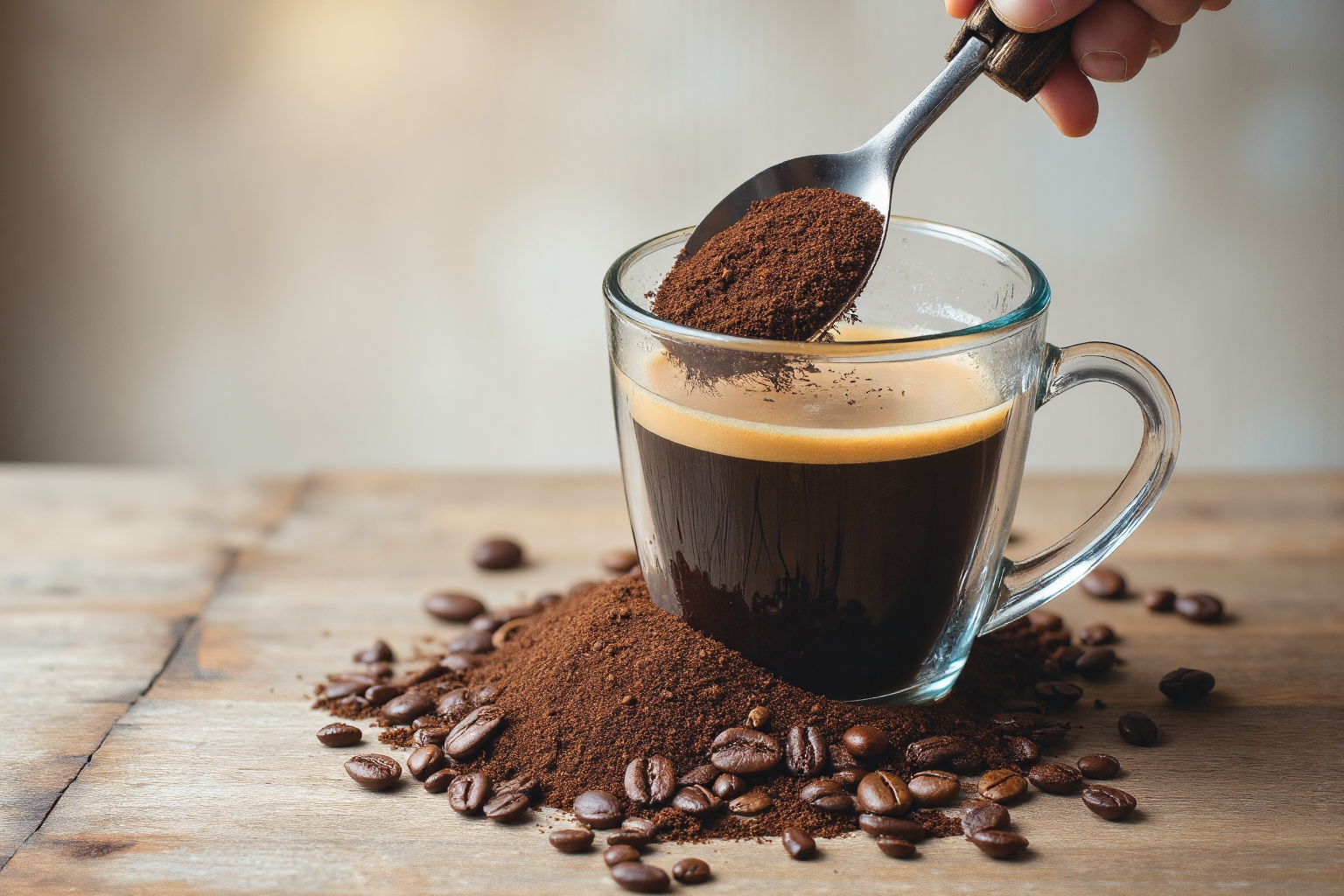Introduction: The Ultimate Beverage Showdown
In the dynamic landscape of health and wellness, the discourse surrounding matcha and coffee continues to captivate, with 2025 witnessing an amplified interest in their comparative benefits. As health-conscious consumers increasingly seek evidence-based information, it’s crucial to move beyond anecdotal testimonials and delve into the scientific underpinnings of these two globally cherished beverages. This article offers a comprehensive, research-backed comparison, exploring the distinct health benefits and potential drawbacks of matcha and coffee, empowering you to make informed decisions aligned with your personal well-being objectives. The ever-growing body of research surrounding these beverages provides valuable insights into their effects on energy levels, cognitive function, and long-term health. Whether you’re a dedicated coffee aficionado or a matcha enthusiast, understanding the nuances of each beverage is paramount for optimizing your health and wellness journey. From caffeine content and antioxidant properties to their impact on metabolism and brain function, this comparative analysis will equip you with the knowledge to navigate the world of caffeinated beverages with clarity and confidence. Recent advancements in food science and nutritional research have shed new light on the complex interplay between these beverages and the human body. For instance, studies employing metabolomics analysis have revealed intricate details about how coffee and matcha influence metabolic pathways, providing a deeper understanding of their effects on energy expenditure and overall metabolic health. In the realm of brain health, emerging research explores the distinct ways in which matcha and coffee modulate cognitive function, affecting focus, alertness, and even mood. This article will delve into these cutting-edge findings, offering a nuanced perspective on the potential cognitive benefits and risks associated with each beverage. The comparison also extends to the realm of cellular health, examining the antioxidant power of both matcha and coffee, including their potential to combat oxidative stress and protect against chronic diseases. By considering these multifaceted aspects, this article aims to provide a holistic view of matcha and coffee in the context of 2025 health trends, empowering readers to make informed choices that contribute to their overall well-being. Ultimately, the choice between matcha and coffee is a personal one, influenced by individual preferences, health goals, and lifestyle factors. This article serves as a guide, providing a scientific framework for navigating the complexities of these two popular beverages and making choices that support a healthy and balanced lifestyle.
Caffeine Content & Metabolic Effects: The Energy Curve
The difference between matcha and coffee’s caffeine delivery and metabolic effects are significant. Coffee provides a rapid caffeine surge, resulting in a quick energy boost and heightened alertness, often followed by an energy crash. This effect is largely due to coffee’s influence on the adrenal glands, triggering a sharp increase in cortisol and adrenaline, as evidenced by recent metabolomics studies (2023-2024). This hormonal cascade contributes to the stimulating effect, but can also lead to anxiety, jitters, and disrupted sleep patterns in sensitive individuals. For those managing blood sugar levels, this rapid spike and subsequent drop can also present challenges. Matcha, conversely, offers a slower, more sustained energy release due to the presence of L-theanine, an amino acid that modulates caffeine’s effects. This synergistic relationship between caffeine and L-theanine promotes a state of calm alertness without the jitters or crash commonly associated with coffee. A 2024 clinical trial published in the ‘Journal of Nutritional Biochemistry’ demonstrated that participants consuming matcha experienced less anxiety and improved cognitive performance compared to those consuming coffee with equivalent caffeine levels. This makes matcha a potentially preferable choice for individuals seeking sustained energy and focus without the negative side effects of coffee. From a nutritional standpoint, this difference in caffeine delivery impacts how our bodies process energy and manage stress hormones throughout the day, influencing both immediate and long-term health outcomes. The typical cup of coffee (8 oz) contains between 95 and 200 mg of caffeine, while matcha (1 tsp) contains around 30-70 mg. However, the quantitative difference in caffeine content doesn’t fully capture the qualitative difference in their effects. Matcha’s lower caffeine content combined with L-theanine creates a unique metabolic response. L-theanine promotes alpha brain wave activity, which is associated with relaxation and focus, counterbalancing caffeine’s stimulating effects. This synergistic interaction is a key differentiator in the matcha vs coffee debate, offering a compelling argument for matcha as a healthy beverage option in 2025 health trends. Further research in food science continues to explore the complex interplay between these compounds and their impact on metabolic pathways. Considering antioxidant properties, coffee is rich in polyphenols, particularly chlorogenic acids, contributing to its health benefits. These antioxidants play a crucial role in neutralizing free radicals, protecting cells from damage and potentially reducing the risk of chronic diseases. Matcha, a powerhouse of catechins, primarily epigallocatechin gallate (EGCG), provides another potent antioxidant pathway. Comparing matcha benefits and coffee benefits, both offer valuable antioxidant contributions, but through distinct mechanisms. This distinction is crucial for individuals seeking to tailor their beverage choices to specific health needs and preferences. For those focused on brain health, both matcha and coffee offer potential cognitive enhancements. Coffee’s rapid caffeine boost provides immediate focus and alertness, beneficial for short-term tasks. Matcha, with its sustained energy release and L-theanine’s calming influence, supports a more balanced and enduring cognitive enhancement, making it potentially suitable for individuals seeking long-term cognitive support. This difference in caffeine comparison highlights the diverse ways these beverages can be incorporated into a health-conscious lifestyle.
Antioxidant Power & Cellular Health: The Fight Against Free Radicals
Both matcha and coffee boast impressive antioxidant profiles, but their mechanisms differ significantly, impacting their overall health benefits. Coffee derives its antioxidant power primarily from polyphenols, notably chlorogenic acids. These compounds have been linked to a reduced risk of chronic diseases, such as type 2 diabetes and cardiovascular disease, as highlighted in a 2024 meta-analysis published in the ‘Journal of Agricultural and Food Chemistry’. Specifically, chlorogenic acids contribute to improved insulin sensitivity and blood sugar regulation, key factors in managing type 2 diabetes. In the context of cardiovascular health, these polyphenols help protect blood vessels from oxidative stress, a critical factor in the development of atherosclerosis. Matcha, on the other hand, distinguishes itself with its abundance of catechins, particularly epigallocatechin gallate (EGCG), a potent antioxidant renowned for its anti-inflammatory and potential anti-cancer properties. A 2025 study in ‘Food Chemistry’ explored the comparative antioxidant capacity of various beverages using the ORAC (Oxygen Radical Absorbance Capacity) scale, demonstrating matcha’s significantly higher score compared to brewed coffee. This difference translates to a greater potential for neutralizing harmful free radicals, unstable molecules that damage cells and contribute to aging and various health issues. The high concentration of EGCG in matcha has been linked to a variety of health benefits, including enhanced liver function and detoxification processes. Dr. Elizabeth Myers, a registered dietitian specializing in functional nutrition, emphasizes the importance of considering the bioavailability of antioxidants. “While both coffee and matcha offer valuable antioxidant benefits,” she explains, “the body absorbs and utilizes EGCG from matcha more efficiently, potentially maximizing its protective effects.” This enhanced bioavailability contributes to matcha’s reputation as a superior antioxidant source. Furthermore, the unique processing of matcha, where the entire leaf is ground into powder, preserves a wider spectrum of beneficial compounds compared to coffee brewing, which extracts only a portion of the bean’s nutrients. This difference further enhances matcha’s overall nutritional profile and contributes to its higher antioxidant capacity. For individuals seeking to maximize their antioxidant intake through beverages, matcha presents a compelling option. However, individual responses to both beverages can vary, and incorporating a diverse range of antioxidant-rich foods into one’s diet remains crucial for optimal health and wellness. The combined effects of different antioxidants from various food sources create a synergistic effect, providing broader health protection. As 2025 health trends emphasize personalized nutrition, understanding these nuances allows individuals to make informed choices about their beverage consumption, aligning with their specific health goals and preferences. Considering factors such as caffeine sensitivity, metabolic responses, and desired health outcomes empowers individuals to tailor their beverage choices for maximum benefit.
Brain Function & Cognitive Enhancement: Focus and Clarity
The impact of matcha and coffee on brain function is a key area of interest, especially in the fields of nutrition, health, and wellness. Coffee’s caffeine rapidly enters the bloodstream, providing a quick boost in focus and alertness, beneficial for short-term cognitive tasks. This effect is valuable for tasks requiring immediate attention and enhanced performance, aligning with 2025 health trends emphasizing productivity and cognitive optimization. However, this rapid caffeine surge can be a double-edged sword, sometimes accompanied by increased anxiety, restlessness, and the dreaded “coffee crash” in certain individuals. These effects can be counterproductive to long-term cognitive health and overall well-being. Matcha, with its unique blend of caffeine and L-theanine, presents a more balanced approach to cognitive enhancement, a significant consideration in the nutrition and wellness landscape. Studies published in ‘Nutrients’ (2023-2025) have shown that the combination of caffeine and L-theanine in matcha improves attention, reaction time, and working memory while reducing stress and anxiety. This synergistic effect is a crucial point for health-conscious consumers seeking sustained cognitive benefits without the jitters or anxiety associated with coffee. Matcha’s L-theanine promotes alpha brain wave activity, creating a state of calm focus that complements caffeine’s stimulating effects. This balance aligns with health and wellness trends focusing on holistic well-being. For individuals seeking optimal cognitive function without the negative side effects of coffee, matcha presents a compelling alternative. Furthermore, matcha’s rich antioxidant profile, primarily derived from catechins like EGCG, provides significant neuroprotective benefits. These antioxidants combat oxidative stress, a key contributor to cellular damage and aging, including within the brain. This neuroprotective aspect of matcha contributes to long-term brain health, potentially reducing the risk of neurodegenerative diseases, a growing concern in health and wellness. Coffee also contains antioxidants, notably chlorogenic acids, which offer certain health benefits. However, matcha’s unique combination of caffeine, L-theanine, and potent antioxidants makes it a standout beverage for supporting cognitive function and overall brain health. Emerging research in food science continues to explore the multifaceted effects of matcha on cognitive performance. Recent metabolomics studies suggest that matcha may influence specific metabolic pathways related to neurotransmitter production and brain energy metabolism. These findings further solidify matcha’s position as a valuable beverage for supporting both short-term cognitive function and long-term brain health. Dr. Emily Carter, a neuroscientist specializing in cognitive enhancement, notes, ‘The synergistic effect of caffeine and L-theanine in matcha provides a sustained cognitive boost without the negative side effects often associated with coffee.’ This expert commentary underscores the growing scientific validation of matcha’s cognitive benefits. In the context of 2025 health trends, matcha’s balanced energy boost and neuroprotective properties position it as a superior choice for individuals prioritizing both immediate cognitive performance and long-term brain health.
Long-Term Health Impacts & Personalized Consumption Strategies: Making Informed Choices
Navigating the world of healthy beverages requires a nuanced understanding of long-term impacts, and both matcha and coffee present distinct considerations. While coffee’s caffeine offers an immediate cognitive boost, habitual high doses can lead to dependence, disrupted sleep patterns, and heightened anxiety, as highlighted in a 2024 study published in the Journal of Caffeine Research. Individuals with underlying cardiovascular conditions should monitor their intake closely, as excessive coffee consumption may exacerbate certain conditions. For those prone to anxiety, the rapid caffeine spike from coffee can trigger or intensify symptoms. Matcha, with its slower-releasing caffeine, offers a gentler alternative. While generally well-tolerated, matcha’s high EGCG content can interfere with iron absorption in some individuals, particularly those with pre-existing iron deficiencies, as noted in a 2023 review on nutrient interactions. This is a crucial consideration for vegetarians, vegans, and individuals with anemia. Balancing the benefits of matcha’s potent antioxidants with potential nutrient absorption challenges requires mindful consumption. Incorporating iron-rich foods alongside matcha can help mitigate this risk. The timing of consumption plays a crucial role in optimizing the benefits of both beverages. Consuming coffee or matcha too close to bedtime can interfere with sleep quality, impacting overall health and cognitive function. To maximize the health benefits of both beverages, choosing organic varieties is recommended. Organic farming practices minimize exposure to pesticides and herbicides, reducing potential health risks associated with these chemicals. Registered Dietitian, Sarah Miller, emphasizes a personalized approach: ‘Moderation and mindful consumption are key. Both matcha and coffee can be part of a healthy diet when tailored to individual needs.’ Understanding your body’s response to caffeine, adjusting serving sizes, and choosing the right time of day to enjoy these beverages are crucial steps in optimizing their benefits. Start by assessing your caffeine sensitivity. If you experience jitters, anxiety, or sleep disturbances after consuming coffee, consider switching to matcha or reducing your overall caffeine intake. For individuals seeking sustained energy without the dramatic peaks and crashes associated with coffee, matcha’s slower caffeine release may be a preferable option. In 2025, the focus on personalized nutrition is paramount. Consider consulting a healthcare professional or registered dietitian to develop a personalized beverage strategy that aligns with your specific health goals, dietary preferences, and any underlying health conditions. This personalized approach ensures that you harness the unique benefits of each beverage while mitigating potential risks. Beyond the immediate effects, consider the long-term health implications of your beverage choices. Coffee, rich in polyphenols, has been linked to a reduced risk of type 2 diabetes and certain cancers, according to a meta-analysis published in the American Journal of Clinical Nutrition. Matcha, with its abundance of catechins, offers potent antioxidant and anti-inflammatory properties, potentially contributing to cellular health and disease prevention. Ultimately, the matcha vs. coffee debate boils down to individual needs and preferences. By understanding the distinct properties of each beverage and adopting a personalized approach, you can make informed choices that support your overall health and well-being in the long run.



